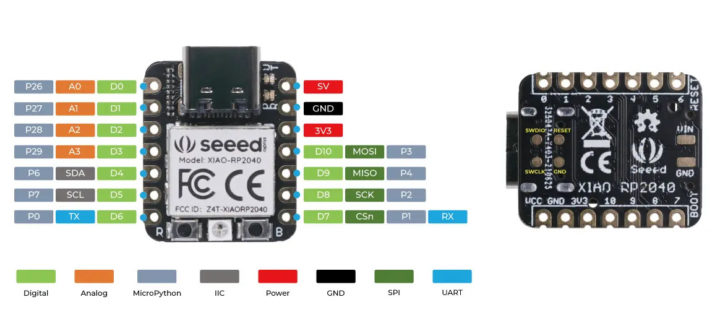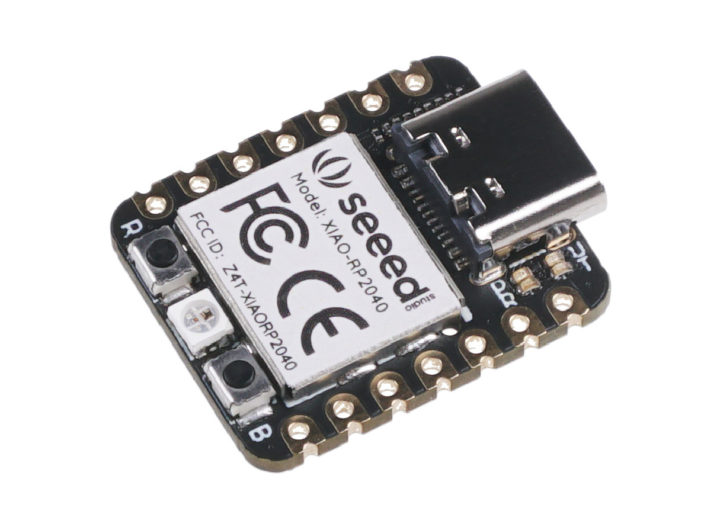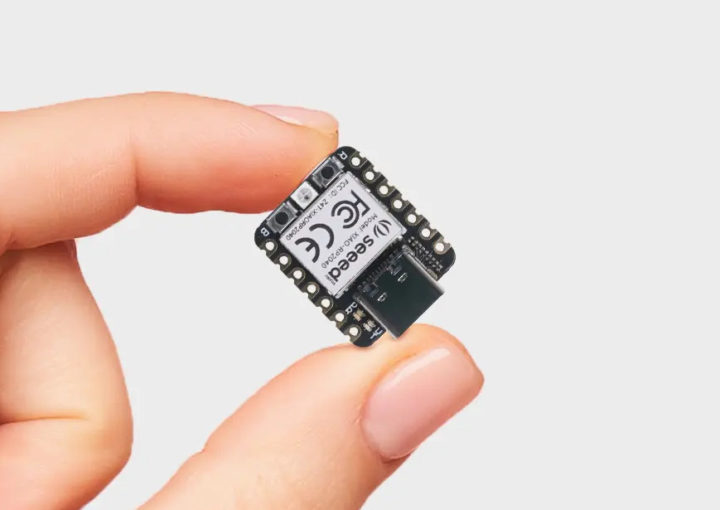Seeeduino XIAO is a tiny Arduino Zero compatible board with battery support that was launched last year with Microchip SAMD21G18 ARM Cortex-M0+ microcontroller at up to 48MHz.
Seeed Studio has now launched the XIAO RP2040 board with the same form factor but upgrading to a more powerful Raspberry Pi RP2040 dual-core Cortex-M0+ microcontroller clocked at up to 133 MHz.
XIAO RP2040 specifications:
- MCU – Raspberry Pi RP2040 dual-core Cortex M0+ up to 133 MHz, or even 252 MHz (48MHz default) with 264 kB SRAM
- Storage – 2MB SPI flash
- USB – 1x USB type C port for power and programming
- Expansion I/Os
- 2x 7-pin headers with
11x4x analog inputs, 11x digital I/Os / PWM,1x DAC, SPI, UART, and I2C; 2.54mm pitch - 3.3V I/O voltage (not 5V tolerant)
- 2x 7-pin headers with
- Misc – 1x user LED, power LED, 2x LEDs for serial port downloading, Reset Button/ Boot Button, RGB LED, SWD pads
- Power Supply – 5V via USB-C power, power pads (VIN/GND) for battery
- Dimensions – 20 x 17.5 mm

The new XIAO RP2040 mostly offers advantages over the original Seeeduino XIAO board with a more capable MCU, more RAM (256KB vs 32KB), more storage (2MB vs 256KB), and extra components like an RGB LED as well as Reset and Boot buttons. On the downside, you’d lose access to some Analog pins, and there’s no DAC interface.
The new board is compatible with the old, and as such, also supports XIAO expansion board, and can be programmed with the Arduino IDE, but also MicroPython and CircuitPython. You’ll find the instructions on the Wiki, but if you’ve ever gotten started with Raspberry Pi Pico the experience should be similar.
The board’s small size and features make it suitable for wearable devices, rapid prototyping, as an alternative to projects based on Arduino Mini, DIY keyboards, and various USB development.
It’s not the only tiny RP2040 board on the market, as we previously covered Pimoroni Tiny 2040 and Adafruit QT Py RP2040 with very similar form factors, as well as PGA2040 that’s more of a module. But XIAO RP2040 board may be the most cost-effective, as Seeed Studio will sell it for $5.40 once it is in stock.

Jean-Luc started CNX Software in 2010 as a part-time endeavor, before quitting his job as a software engineering manager, and starting to write daily news, and reviews full time later in 2011.
Support CNX Software! Donate via cryptocurrencies, become a Patron on Patreon, or purchase goods on Amazon or Aliexpress







Considering the existing Xiao has been backordered since the beginning of June, I wonder if this one will actually ship. I guess that’s what I get for designing a project with it :/
ok, but why not MMU?!!!
linux need 16MHz why not using normal rtos or unix?
(I need machanical keyboard with this firmware or system)